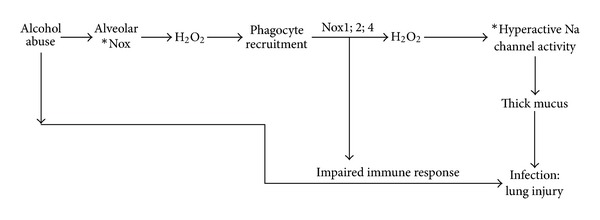Figure 2.

Overview of the complex interplay between cells and proinflammatory mediators which might orchestrate the pathogenesis of acute lung injury. We propose that chronic alcohol abuse disrupts the lung epithelium and activates tissue Nox enzymes, producing low levels of H2O2, which can diffuse to nearby blood vessels and chemoattract phagocytes. Asterisks indicate causal connection established between alveolar Nox activity and lung ENaC. In the alcohol lung, phagocytes have elevated Nox1, Nox2, and Nox4 activity, which oxidizes the extracellular milieu and alters normal cell function. Because of ongoing drug discovery efforts in developing more sensitive and specific Nox inhibitors, studying the role of Nox enzyme in alcohol-related lung injury is important. Because the alcohol lung is more susceptible to infection and injury, studying the intimate relationship between AM and epithelial transport is important.
